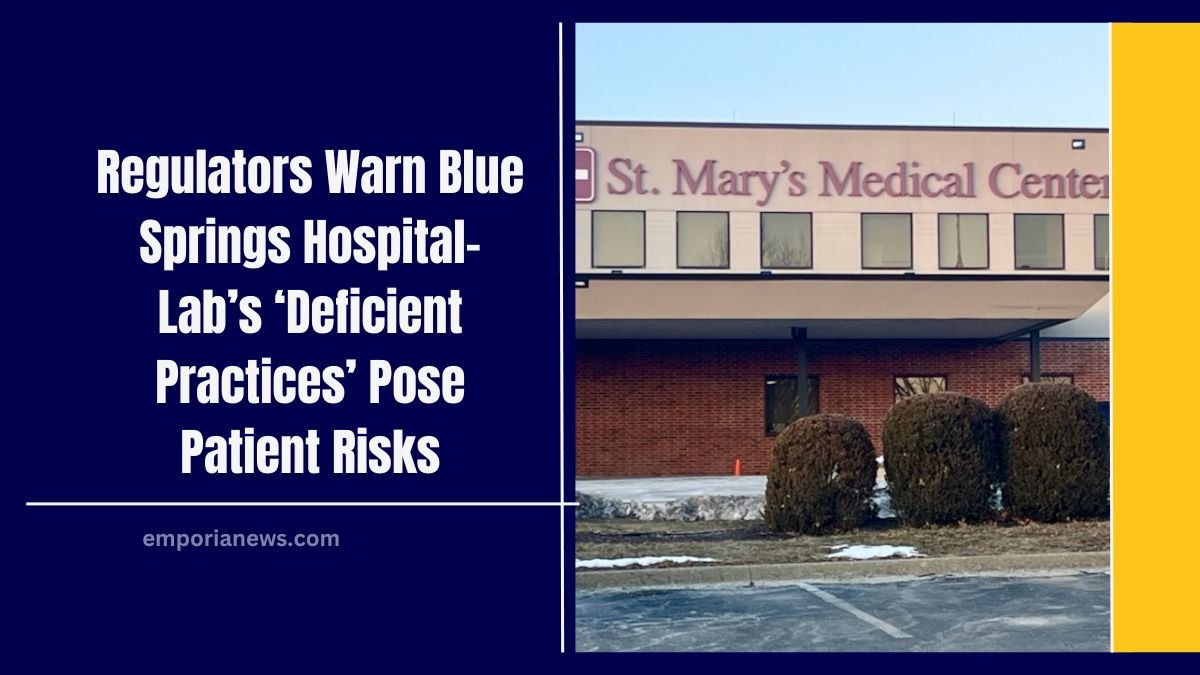In a troubling development, regulators have flagged St. Mary’s Medical Center in Blue Springs, Missouri, for “deficient practices” in its laboratory operations that could jeopardize patient safety.
The Missouri Department of Health and Senior Services (DHSS) issued a warning following a detailed inspection that revealed several lapses in testing procedures, staff training, and quality control measures.
This article explores the critical findings, the hospital’s response, and the potential consequences of the deficiencies.
Key Findings in the Laboratory Investigation
The DHSS’s inspection, conducted in December 2023, identified the lab at “immediate jeopardy”—the most severe level of regulatory noncompliance.
This designation is reserved for situations where deficiencies “have already caused, are causing, or are likely to cause serious injury, harm, or death.”
Highlighted Issues:
- Inadequate Blood Bank Procedures
- The laboratory failed to provide comprehensive procedures for all blood bank operations initiated in October 2023.
- Blood was issued to patients without proper labeling or adherence to protocols, risking incorrect blood transfusions.
- Insufficient Staff Training
- Employees were performing patient tests without proper training, leading to the possibility of inaccurate results.
- Quality Control Failures
- Alarm inspections on a blood bank refrigerator were not documented.
- A urinalysis centrifuge was found operating at an incorrect speed.
- Critical test controls, such as those for vitamin B12, were outside acceptable limits for extended periods.
- Director Oversight Issues
- The lab director failed to provide proper management and direction, exacerbating systemic failures.
| Category | Issue Identified | Potential Risk |
|---|---|---|
| Blood Bank Procedures | Lack of labeling and protocol adherence | Incorrect transfusions, patient harm |
| Training Deficiencies | Untrained staff performing patient tests | Inaccurate test results, misdiagnoses |
| Quality Control | Missing inspections, improper equipment usage | Delayed diagnoses, treatment errors |
| Leadership Oversight | Failure of lab director to manage operations | System-wide procedural breakdowns |
Hospital Response and Corrective Actions
Hospital Statement
St. Mary’s Medical Center acknowledged the findings and stated that corrective measures are already underway.
The hospital emphasized that no patients were harmed during the survey process and reassured the public that its laboratory services remain operational.
Immediate Adjustments:
- Submission of a Corrective Action Plan to DHSS and the Centers for Medicare and Medicaid Services (CMS).
- Transition of blood bank services to St. Joseph Medical Center, a partner hospital, ensuring uninterrupted service for patients.
Despite these steps, the lab director position remains vacant, highlighting ongoing challenges in leadership.
Potential Consequences of Immediate Jeopardy
Being placed under “immediate jeopardy” status comes with severe repercussions, including:
- Loss of Medicare Accreditation:
Accreditation loss could result in a significant reduction in revenue and patient trust. - Fines and Monitoring:
The hospital may face fines and increased regulatory scrutiny through onsite monitoring. - Reputational Damage:
Repeat violations (as seen with St. Mary’s 2022 citation involving emergency department practices) undermine public confidence in the facility.
Previous Violations and Pattern of Noncompliance
This is not the first time St. Mary’s Medical Center has faced scrutiny. In 2022, the hospital resolved another immediate jeopardy finding related to physical force used in the emergency department.
The corrective measures included staff training and the dismissal of an involved employee.
The recurrence of serious citations raises concerns about the hospital’s ability to sustain compliance with healthcare regulations.
Broader Implications for Patient Safety
Laboratory errors can have dire consequences for patient care. Deficiencies such as untrained personnel, missing quality checks, and procedural lapses could lead to:
- Misdiagnoses: Delays or inaccuracies in testing could cause delayed treatments or incorrect medications.
- Harm from Improper Blood Transfusions: Mistakes in blood bank operations may result in adverse reactions or fatalities.
- Long-Term Impact on Trust: Patients rely on healthcare facilities to prioritize safety and accuracy; repeated violations erode this trust.
The warning issued to St. Mary’s Medical Center underscores the critical importance of adhering to stringent laboratory standards in healthcare.
While the hospital has initiated corrective actions, the findings highlight systemic issues that could endanger patient safety. Moving forward, sustained efforts to improve staff training, quality control, and leadership oversight will be crucial in restoring trust and ensuring compliance.
For the patients and community of Blue Springs, it’s a stark reminder of the significance of regulatory accountability in healthcare systems.
FAQs
What does “immediate jeopardy” mean in healthcare?
“Immediate jeopardy” indicates that a healthcare facility’s deficiencies have caused or are likely to cause serious injury, harm, or death to patients. It is the most severe regulatory noncompliance designation.
Has St. Mary’s Medical Center resolved its deficiencies?
The hospital has submitted a corrective action plan and transitioned its blood bank services to another facility. CMS is reviewing the plan to determine its adequacy.
What happens if the hospital loses Medicare accreditation?
Loss of accreditation could lead to reduced revenue, reputational damage, and limited access to federal healthcare programs, significantly impacting operations.




